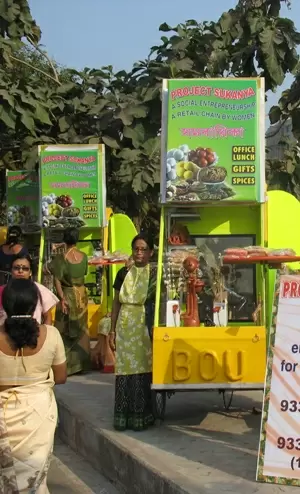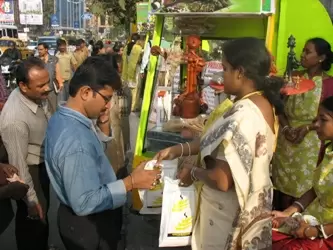Project Sukanya helps nearly 4000 poor women earn a livelihood

15-July-2011
Vol 2 | Issue 28
Big retail chains like Reliance Fresh, Spencer's and Big Bazaar have competition. Not from a rival business group, but from a Kolkata-based enterprising woman - Aparna Banerjee. An alumnus of the prestigious Xavier Labour Relations Institute (XLRI) in Jamshedpur, Bihar, Banerjee, 36, retails her goods under the name of Project Sukanya.
The goods are not sold from huge showrooms, but from 54 roadside mobile kiosks, manned by 141 women who work in shifts. Another 3,500 women directly benefit from this project by making products such as handicraft items, edibles like 'papad' (wafer thin potato/rice paste snacks), pickles and jams.
 |
|
At your service: Mobile kiosks, manned by women working with Project Sukanya, are located across the city of Kolkata(Photos: WFS)
|
Packaged spices and ready-to-eat lunches are also sold. And in the coming six months another 500 'bou carts' (women carts) would be deployed across 18 districts, again manned by women.
"When I got the idea for these mobile kiosks, my first step was to finalise the design and patent it under the Intellectual Property Rights Act. The Project Sukanya retail chain is also patented," says Banerjee. The project was the result of extensive research based on material gathered from 62 villages across India during her studies on Anthropology at Calcutta University.
"I did my MBA in Logistics and Supply Chain Management from XLRI and realised during that time that I wanted to become a social entrepreneur. I then did a course in Anthropology to get a grip on human rights. I realised that women need financial independence to get freedom from restrictions, abuse and social taboos," says Banerjee, who struggled to complete her studies under great financial constraints.
"I found that retail was the only option. But setting up huge retail space was beyond my capabilities. I hit upon the mobile kiosk idea and worked on it for two years, getting all required permissions and licences to place them on the roads. No loophole was left open. The carts are manufactured at our own unit," she adds.
When Banerjee sent her pilot Project Sukanya to the Prime Minister's Office (PMO) in 2005, Dr Manmohan Singh had encouraged her to go ahead, assuring assistance in case of hurdles. When apprised, the then Chief Minister of West Bengal, Buddhadeb Bhattacharjee, also instructed his secretariat to offer support.
 |
|
Shop till you drop: The 'bou carts' (women carts) retail handicraft products; edibles like pickles, jams and 'papad' (wafer thin potato/rice paste snacks; packaged spices and even ready-to-eat lunches |
The attractively designed sleek kiosks, which are placed at most major crossings in the city, easily catch the eye. The apron-clad women manning them are polite and knowledgeable about the products.
Kakoli Das, 24, is one of the smiling faces at the Rashbehari kiosk. "We don't have any problems with the police regarding parking of our kiosk. Our paperwork is watertight. The customers, too, are friendly. We get repeat clients on a regular basis now."
The turnover for the Project, which started rolling in early 2007, had already reached Rs 10.5 million by mid-2008.
"The organised sector never bothered to tap the potential of the cottage industry, but we are giving a brand identity to these products," says Sudakshina Sen, 43, Chief Coordinator, Project Sukanya.
Project Sukanya has a 20,000 sq. ft. common facility centre at Topsia. The rural, women who supply the products, come here with their samples. The products are graded into three categories. Under A category, the product is immediately bought with a 10 per cent advance. For the B category products, Sukanya gives support for better packaging and then it is bought. Falling under the C category are products that have market saturation.
The success of the venture is obvious from the fact that several big retail chains made offers to buy out Project Sukanya as well as the patent for the mobile kiosks.
All women associated with the project are happy. Jayanti Chatterjee, 49, who is in charge of the Sukanya Tollygunge kiosk, earns about Rs 3,000 a month.
Swapna Dutta, 50, an urban poor, was dumped by her husband during the initial years of their marriage. The Sukanya project came to her rescue and she now earns Rs 2,800 a month.
"It's a Chinese model for promotion of alternative employment. We would provide the infrastructure and training required for setting up the centre," says Banerjee. – Women’s Feature Service
















